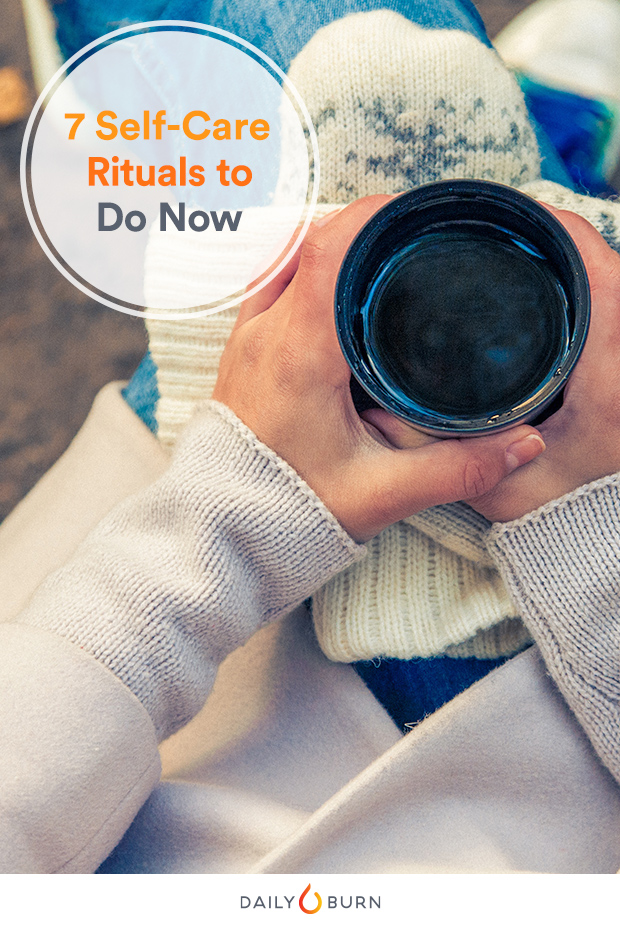
“Self-care” has become a cultural buzzword of late — and thank goodness for that! In a society that seems to value productivity, achievement and economic gain above all else, it’s important to periodically hone in on the other aspects of life. (Ahem, the ones tied to your own well-being.) Self-care can mean anything from taking a walk in the park during your lunch break, or reserving a few minutes each night to meditate or color. For others, it can involve writing their thoughts in a journal or practicing some yoga.
At its core, self-care is simply the act of performing with intention any action that brings you physical, mental, and/or emotional pleasure and allows space for introspection. To get a daily self-care routine down that truly works for you, try experimenting with different activities that make you happy. Whether you’re new to self-care or you’re looking to expand your practice, these free rituals offer a great place to start.
RELATED: 40 Resources for Practicing Mindfulness Every Day
7 Simple Self-Care Rituals to Relieve Stress
1. Get outside.
It sounds so simple, but turning off your computer (or the TV and smartphone) and getting outside is one of the best things you can do for yourself. Research has shown that being in nature can help reduce blood pressure and muscle tension, slow the production of stress hormones, and might even reduce mortality. Experiencing the great outdoors is also good for your mental state. Those calming sounds of birds chirping and leaves rustling in the wind enable you to feel more relaxed and balanced. Stick at it, and they may even quash feelings of anger, fear, pain and stress, too.
And then there’s this: Being one with nature can help you feel more connected to other people and the world as a whole. Simply taking a walk around the block, going on a short hike, or sitting in the grass for a while is a powerful act of self-care.
2. Give coloring a try.
There’s good reason behind the rise of the adult coloring book craze. Breaking out the crayons, markers or pencils is similar to art therapy. Art therapy has been shown to help people clarify their feelings, resolve emotional conflicts, reduce anxiety and improve their self-awareness. It’s also just a great act of creative expression. There’s even some research to suggest that coloring may have a meditative effect.
RELATED: 22 Simple Steps to a Healthy, Happy Morning
3. Journal.
Keeping a diary shouldn’t end in elementary school. People of all ages can benefit from free-writing their thoughts, feelings and experiences. And if you don’t like pressing pen to paper, then you can simply use the notepad on your computer or the notes app on a smartphone. Journaling allows you to clarify your thoughts and feelings, identify possible solutions to interpersonal issues or internal conflicts, and generally get more in touch with yourself. The bonus is that you’ll be able to thumb back through the pages to follow your growth over time.
4. Meditate.
When it comes to self-care, meditation is arguably one of the most accessible — and effective — strategies around. It requires no money, special equipment, or experience whatsoever to meditate for the first time. While there are many meditation techniques, they all center around one common theme: focusing on internal presence and stillness while allowing the mind to go quiet. Whether you practice for 10 minutes or an hour a day, meditation yields impressive benefits, like reducing mental and physical stress and improving concentration and immune system function.
5. Practice yoga.
You don’t need to pay for a studio membership — or be an expert-level yogi — in order to reap the benefits of yoga. Thanks to cheap yoga apps and free online tutorials, you can enjoy all of these benefits of downward dogging in the comfort of your living room. Just a little om time each week can help decrease stress, release physical tension and improve psychological well-being, self-awareness and overall relaxation.
RELATED: Single-Tasking: The Secret to Less Stress, More Productivity
6. Spend time with animals.
It’s not just dogs that are humankind’s best friend. Spending time with animals of all stripes has been shown to improve people’s mental and physical health. (Heck, it may even improve relationships with other humans!) Even if you don’t own a pup, you can play with horses (equine therapy), catsit for your friend, or volunteer at an animal shelter. Having a furry friend by your side can help you relax, reduce your blood pressure, and bring a whole lot of joy to your day (trust us on this one).
7. Take a bath.
A long, hot soak in the tub is just what the doctor ordered. Taking a bath has been shown to reduce stress, improve mood and assist in the release of physical and emotional tension. In fact, the soothing elements of H2O have been known for to help treat anxiety and pain. If you want a one-two punch of self-care, try adding some essential oils to the water so you can reap the benefits of both bathing and aromatherapy.
As you begin a self-care practice, expect a process of trial and error as you figure out what feels most pleasurable and relaxing to you. Once you’ve identified your favorite self-care activities, make a point of turning them into a series of daily, weekly and monthly habits. (For example, you might choose to meditate every day, practice yoga once a week, and volunteer at an animal shelter once a month.)
It can also be helpful to establish a backup plan for each of your rituals. So if you can’t manage to log that hour of Vinyasa, know that it’s OK to practice for only 20 minutes on a busy day. The important thing is that you stay at it, and don’t give up on self-care when life gets hectic. After all, that’s when you need self-care the most!
